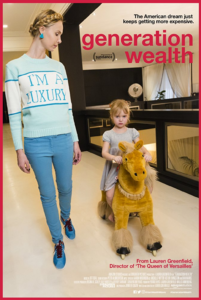Lauren Greenfield, the director who literally struck gold with “The Queen of Versailles,” mines familiar territory and even turns the camera on herself in a loose, scattershot examination of greed in modern society.
 A personal, cathartic exercise, filmmaker Greenfield, the talent behind the heart-breaking documentary “Thin,” revisits her favorite subject: wealth. But really her film is an indictment of greed and selfishness, as she interviews a number of ambitious people, who have sacrificed a close relationship to family in order to achieve financial goals. Greenfield herself is not immune to the gravity pull of fame and fortune, as she admits that her career has affected her own family. But the unanswered question is: what would be the alternative?
A personal, cathartic exercise, filmmaker Greenfield, the talent behind the heart-breaking documentary “Thin,” revisits her favorite subject: wealth. But really her film is an indictment of greed and selfishness, as she interviews a number of ambitious people, who have sacrificed a close relationship to family in order to achieve financial goals. Greenfield herself is not immune to the gravity pull of fame and fortune, as she admits that her career has affected her own family. But the unanswered question is: what would be the alternative?
Tripping through her back catalog of photos, Greenfield is a renown photographer, she interviews some of the subjects of photos she took years earlier. We meet some of the young people that Greenfield captured in the 1990s in her book collection “Fast Forward: Growing Up in the Shadow of Hollywood.”
 Now in their late thirties and early 40s, they remember their teen years that were marked by excess and risky behavior. Some lament that time and express regret as to bad decisions. Personal responsibility is only hinted at. The root of their problems, arguably according to the film, is that their parents were incredibly wealthy and never really around. The green poultice of money was no substitute for traditional parenting.
Now in their late thirties and early 40s, they remember their teen years that were marked by excess and risky behavior. Some lament that time and express regret as to bad decisions. Personal responsibility is only hinted at. The root of their problems, arguably according to the film, is that their parents were incredibly wealthy and never really around. The green poultice of money was no substitute for traditional parenting.
Perhaps the best series of interviews are with Florian Homm, a former Hedge-fund manager, who was once listed as one the FBI’s most wanted. But even though Homm breaks down and expresses remorse for his actions, without ever specifically making an admission of criminal wrong-doing, Greenfield fails to prove anything more than the fact that Homm made bad decisions. The greed got him, I suppose, and this movie is not interested in anyone who became immensely successful without succumbing to criminality or depravity. All we get are a series of bad examples.

Missing is an interview with someone like Bill Gates, for example. And the emphasis on Hollywood kids is a little too narrow. Homm’s son, who appears with his girlfriend in the film, seems to be well-adjusted, however, we have no idea, because Greenfield spends no time giving us any backstory about him. It’s all a little too limiting.
Instead of interviewing captains of industry and their family, we get an interview with a porn star, who goes by various names (Kacey/Daveney/Courtney). She now lives in what appears to be a walk-in closet, having lost all of the money she made in the business. We are, also, introduced to Tiffany, a single mom who works as a VIP hostess in Las Vegas. Tiffany and her teenage son appear to live pretty simply. Although they are surrounded by wealth, there’s no sense that they have any of it. These subjects seem a little out of place, although the sequences in which they are involved are entertaining, the relationship to Greenfield’s haphazard narrative seems tangental.

The most effective part of “Generation Wealth” has very little to do with money. Greenfield interviews her mother and her father. Late in the film, her mother, an academic, has an awakening, it appears, on camera. The light bulb pops on. And this moment is effective. Given Greenfield’s chosen career, it makes sense that she would play out a deep personal discussion with a camera running.
And, in one scene, Greenfield’s documenting obsession is placed in some context as her son and husband express frustration that she is filming them in their kitchen as they go about their evening routine. But when the camera is grabbed and turned on Greenfield herself, she instantly becomes self-conscious and awkward. It is an interesting dose of her own medicine, although hardly important enough to justify a feature motion picture.

But the navel-gazing, guilt trip doesn’t stop there. Greenfield, throughout the movie, is shown in her studio carefully going through thousands of photographs in preparation for her next book. And the story chronicles her creative process, which involves a marvelous magnetic white board. Watching the creative process is entertaining, at least, for me, but seems like filler b-roll as Greenfield narrates about the corrupting influence of wealth.
I say “wealth,” because that is the word used in the film’s title. But the theme her is clearly greed. And Greenfield makes use of the universally recognized scene from Oliver Stone’s 1987 film “Wall Street,” with Michael Douglas (who won the Oscar for his role) uttering the iconic words. If I have to repeat those words, this movie isn’t likely for you. In fact, go back and watch “Wall Street” instead.

Ironically, some of the most entertaining parts of “Generation Wealth” involve examples of ridiculous opulence. We get montages with references to things like plastic surgery for dogs. And then there’s Limo Bob, the 50ish proprietor of a limousine company, who is the proud owner of the longest limo in the world. That vehicle has a swimming pool and a helicopter landing pad. But there’s no effort to tell us much about him, other than an inventory of his jewelry. And this distinctive looking fellow seems to be happy in his position. While he’s no Bill Gates, one wonders whether Limo Bob is meant to be a guy who hasn’t been corrupted by money and, yes, wealth.

Limo Bob, Tiffany, Kacey/Daveney/Courtney, and several others are all given a cursory handling as they float in and out of the narrative. Instead of taking time to explore any of their stories in much depth, the film breezily moves on. It’s rather rootless, although an attempt is made to ground the movie with the director’s personal story. And that story is a little too personal, leaving open the fact that Greenfield continues to work and spend time away from her family. Left begging is whether this is a bad thing. Greenfield gives us some bad examples, but fails to provide a counterpoint.
A one-sided examination of people who have made bad decisions, “Generation Wealth” is entertaining when we see excess, but fails to suggest any answers to the greed problem.
